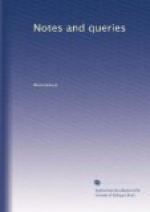I. Can any internal evidence be gathered from the writings of Henry Chettle, as to his family, origin, and birthplace? Kind-Heart’s Dream, the only one of his works which I have either seen or have the means of consulting, contains nothing specific enough to connect him with Dorset, or the West. It would seem, indeed, as if he were acquainted with the New Forest, but not better than with Essex, and other parts adjacent to London.
II. Would it not be worth while to search the Heralds’ Visitations for the county of Dorset, the Will-office, and the Inquisitions “post mortem?” The family was of some consequence, and is mentioned even in Domesday-book as holding lands in the county. Hutchins blazons their arms—Az. 3 spiders, or; but gives no pedigree of the family.
E.A.D.
* * * * *
COVERDALE’S BIBLE.
We are told by Mr. Granville Penn, in the Preface to the Annotations to the Book of the New Covenant, that “in 1535 Coverdale printed an English translation of the Old Testament, to which he annexed Tyndale’s revision of the New, probably revised by himself. These last constitute what is called Coverdale’s Bible. Now, the title-page of Coverdale’s Bible expressly states that it was faithfully and truly translated out of Douche and Latyn into Englishe;” and that this is literally true may be seen by comparing any portion of it with the common German version of Luther. The following portion is taken quite at hazard from the original edition; and I have added Tyndale’s version of 1526, as edited by Mr. Offor:
1535.
JOHN, VI. 41.
The[3] murmured the Iewes ther ouer, that he sayde: I am yt bred which is come downe from heaue[4], and they sayde: Is not this Iesus, Iosephs sonne, whose father and mother we knowe? How sayeth be then, I am come downe from heaue[5]? Iesus answered, and sayde vnto them: Murmur not amonge youre selues. No man can come vnto me, excepte the father which hath sent me, drawe him. And I shal rayse him vp at the last daye. It is wrytten in the prophetes: They shal all be taughte of God. Who so euer now heareth it of the father and lerneth it, commeth vnto me. Not that eny man hath sene the father, saue he which is of the father, the same hath sene the father.
Luther.
41 Da murreten die Juden daruber,
das er sagte: Ich bin das brodt, das
vom himmel gekommen ist.
{55}
42 Und sprachen; Ist dieser
nicht Jesus, Joseph’s sohn, dess vater und
mutter wir kennen? Wie
spricht er denn: Ich bin vom himmel gekommen?
43 Jesus antwortete, und sprach zu ihnen: Murret nicht unter einander.
44 Es kann niemand zu mir
kommen, es sey denn, das ihn ziche der Vater,
der mich gesandt hat; und
Ich werde ihn auferwecken am jungsten tage.
45 Es stehet geschrieben in
den propheten: Sie werden alle von Gott
gelehret seyn. Wer es
nun hoeret vom Vater, und lernet es, der kommt zu
mir.




